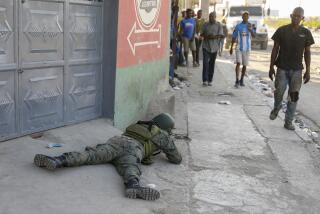Will Chirac Lead Coming Retreat? : Why U.N. can’t bring peace to the Balkans
- Share via
On Thursday and Friday of last week, the United Nations tried to get tough with the Bosnian Serbs, twice bringing in NATO to bomb Serb munitions dumps near Sarajevo. The Serbs responded, however, by getting even tougher with the U.N. They attacked several U.N.-protected “safe areas” and, more important, took hundreds of U.N. hostages, many of them French.
The Serb tactic worked: On Saturday, under French pressure, NATO decided against a third air attack. That Serb victory may soon be followed by a larger one. French President Jacques Chirac, who clearly believes that the U.S.-supported air strikes have backfired, has demanded that U.N. Secretary General Boutros Boutros-Ghali sharply redefine the U.N. peacekeeping mandate. France has long favored redeploying the U.N. peacekeepers to areas still controlled by the Bosnian government and securing for them a supply corridor to the Adriatic. If this proposal is adopted, the supply corridor can and should become an evacuation route for the failed U.N. Protection Force.
France has repeatedly threatened to withdraw its UNPROFOR troops unilaterally. It has held back presumably because unilateral withdrawal would turn Britain into Europe’s crisis-managing power with Germany and the United States in the wings. However, if the endlessly postponed French withdrawal can become a general retreat undertaken at French instigation, France becomes Europe’s crisis-manager and first among equals.
In prevailing upon the U.N. to trigger the NATO attack, the Clinton Administration was responding, in some measure, to Republican pressure, but to what real end? Senate Majority Leader Bob Dole (R-Kan.) has rightly noted that one or two air raids will not change the course of the war. If the U.N. will not ask for protection, then it cannot be protected; and there is every indication that, even with hundreds of its personnel in Serb custody, it will not ask for meaningful protection. Commando raids to free the U.N. hostages are a distinct possibility. But the sustained use of NATO air power to enable the U.N. to do whatever, in humanitarian terms, it wishes in the Balkans--this, clearly, is not in prospect.
Because it is not, because the leading powers lack the will to give even the military support a humanitarian mission requires, that mission should end.
As long ago as Dec. 29, 1992, we wrote:
“The U.N. mission now seems ill-suited to the growing ferocity of the challenge. The peacekeepers, regarded as the enemy, or close to it, by all parties to the conflict, lack both the weapons and the mandate to take the kind of military action that would guarantee their own security, much less that of the country in which they find themselves. It is time to withdraw them. . . . “
This recommendation, offered repeatedly for two years and more, can only be offered again in sorrow. Just how peace will be restored to the Balkans remains a desperately important question. But the continuation of this mission is simply not the answer.
More to Read
Sign up for Essential California
The most important California stories and recommendations in your inbox every morning.
You may occasionally receive promotional content from the Los Angeles Times.













